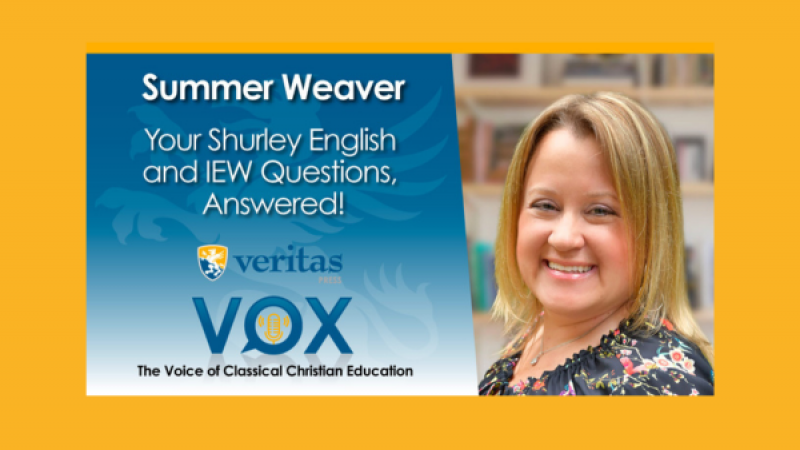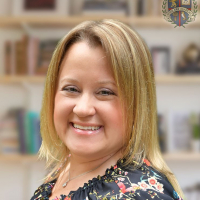Your Shurley English and IEW Questions, Answered! | Summer Weaver

Listen on Apple Podcasts | Listen on Spotify | Watch the Video
What is Shurley English? What is Institute for Excellence in Writing (IEW)? Today we’re talking in depth about these two amazing grammar and writing curriculums and why Veritas Press uses both during the grammar school years! Summer Weaver has been teaching English at Veritas Scholars Academy for 8 years and is here as your guide to discuss how these programs work, why they connect with students, and what your child can gain from their unique approaches.
Episode Transcription
Note: This transcription may vary from the words used in the original episode for better readability.
Marlin Detweiler:
Hello again. I'm Marlin Detweiler with Veritas Vox, the voice of classical Christian education. Today we have someone with us who is an insider. We don't want you to not know that. She'll tell you what that means. But welcome, Summer Weaver.
Summer Weaver:
Thank you. It's good to be here.
Marlin Detweiler:
As we start. Why don't you tell us a little bit about your personal circumstances, where you live, your family, those kinds of things?
Summer Weaver:
Sure. I live in Mount Shasta, California. I’m married to a wonderful man. His name is Todd. He is a dentist. And we have two fantastic sons, Ethan, who is turning 20 and Seth who is turning 17 very soon. So they are both on their way out of high school, entering into the next phase of their lives. But, yeah.
Marlin Detweiler:
Very good. Well, one of the things that you might be thinking is that you're soon going to be empty nesters and that may change things and that sort of thing. I'm not sure I've figured out what an empty nest is yet. It seems like somebody is always back in the nest for some reason.
Summer Weaver:
I hope so. I hope that's the case. I want them to come back.
Marlin Detweiler:
Absolutely. Absolutely. Good. How did you become connected with us, with Veritas?
Summer Weaver:
We were called to begin our homeschooling journey when my oldest son was entering third grade, and I thought, Oh, this will be easy. I have an educational background. It will be great. Well, that was not the case. The first year was very difficult. I was overwhelmed with the amount of curriculum out there, and I found myself changing curriculums throughout the year and just was never really settled.
And that next year I was introduced to classical education and Veritas. And as I started doing my research, I was amazed at how classical education was rooted in history. It was so content-rich. And of course, I appreciated the fact that it had a strong emphasis on language and literacy and was teaching students how to think and learn on their own.
And so we began taking some of the classes at Veritas and just fell in love. A weight was dropped from my shoulders. And then about eight years ago, I had the opportunity to become part of the staff and I have not looked back. I love the curriculum.
Marlin Detweiler:
I know you've been teaching for a long time, but I didn't realize is eight years. That's about the midpoint, slightly shorter. I think we're in our 19th year and about to reregister for the 19th year. So you've been teaching for eight years. What have you taught for us?
Summer Weaver:
I've taught Grammar and Writing, Literature, Linguistics, and Geography North. I think that is the realm of what I've taught.
Marlin Detweiler:
And you are the department head for us, for our grammar school grammar and writing, as I understand it.
Summer Weaver:
Correct. For the grammar school English department. Yes.
Marlin Detweiler:
For those that are listening, it's not that I'm not aware. I'm actually just trying to make sure we get it on the record. And so thank you for humoring me, Summer. So in teaching grammar and writing in grammar school, I don't even at this I don't remember. Do you teach the upper grades? Primarily, say upper grammar school?
Like the 5th-6th grade? Or do you teach the third and fourth as well, or even second?
Summer Weaver:
So the last several years I've been teaching the third and fourth grades. I have taught fifth grade in the past, but I have found my love in the third and fourth-grade classes and I've just sort of stuck with them.
Marlin Detweiler:
People don't realize the sweet spots for teachers with regard to curriculum and with regard to the age of students. I shouldn't say curriculum, but rather subject disciplines. How is it you think you're best connected to a third and fourth-grader?
Summer Weaver:
I love that they are so open to learning and that their minds are just little sponges and they're so excited about it. And so their excitement leads over to me and I get excited about it and I love seeing them hit those milestones and the accomplishments that I think that's why I have just found that this age group suits me so well.
Marlin Detweiler:
Yeah, each age range of kids, it's not just one grade, but each range of kids has a kind of a different approach that motivates them. And when the teacher and the students fit together like that, it makes a big difference. And things that I know our headmaster, Dr. Cannon, is always sensitive to in terms of making sure we have a really best-fit working. It sounds to me like you have found your niche there.
Summer Weaver:
I have. I love to be silly with the kids and work hard with the kids.
Marlin Detweiler:
Now curricularly, it's interesting and there are a whole lot of questions related to it, so let's kind of tackle them one at a time. How did you become familiar with Shurley Grammar and with the Institutes for Excellence in writing? Or as we tend to call it, because it saves energy, IEW. So how did you become familiar with Shurley and then how did you become familiar with IEW?
Summer Weaver:
I became familiar with both of them when I started looking into Veritas and teaching. I started using the curriculum by myself with my own sons and then found that it was much more suited to a group environment. And so that's when I put my sons into the live classes at Veritas. And so that is where I became familiar with it.
Marlin Detweiler:
When you became familiar, you have a background in grammar and writing, correct?
Summer Weaver:
I have an English major and actually, when I taught at the brick-and-mortar, I was teaching seniors in high school. So I went from one spectrum to the next.
Marlin Detweiler:
Very different emphases there. You're dealing with higher levels of composition and things like that here. We're just getting started on paragraphs and storytelling and that sort of thing. Talk to us about Shurley Grammar. What is it you like about it? What is it that you don't care for as much?
Summer Weaver:
I love Shurley Grammar and how it's designed to help students master the parts of speech and sentence structure. It's wonderful. All the jingles that students memorize to help learn the parts of speech just suit that age and they go through learning how to classify sentences using the question-answer flow. And so those things have really stood out to me.
They really provide a solid foundation in grammar. Honestly, the only thing that I might say that I don't like about Shurley Grammar is how the books are set up. But after a family learns how the books are set up and I take time going over that in my classes, then they sort of become familiar with the curriculum and fall in love with it as well.
Marlin Detweiler:
You know, you really make a good point, though. As we publish curriculum, we are very careful to believe that substance matters most, but form matters a lot and so does design. If it doesn't have a form that we can easily learn and follow. And if it doesn't have a design, it's attractive. Sometimes the content never gets realized.
Summer Weaver:
Yes. And it's hard for a parent going into that the first time on their own to try to figure that out.
Marlin Detweiler:
Yeah, that's great. In its uniqueness of the jingles and how things are learned, how would you say that compares them to other- I hate to call it this way, but it's easier. Maybe more traditional approaches to learning grammar.
Summer Weaver:
Shurley does a wonderful job in the mastery of skills, students, master skills, and it always goes back and repeats what they have learned and it grows off what they have learned. Whereas in some of the other curriculums. I feel like that mastery isn't ever really accomplished. It's just the next thing and moving on to the next concept, moving on to the next topic.
Marlin Detweiler:
Yeah, I can see that. Now, Shurley Grammar does have a writing component to it, but we don't use it. We use the Institute for Excellence in Writing. Tell us in the gap here as we transition from talking about Shurley to talking about IEW, what you believe is the reason that we should do that.
Summer Weaver:
IEW teaches students to write using nine structural models, which include writing from paragraphs, essays, reports, writing from pictures, inventive writing, and formal essays. And I feel that it really takes what I call the blank page, staring off into the stars or the doodling out of the equation when learning how to write because it gives students a formula to follow, and it allows every student to be successful because they don't have to try to come up with what they are writing.
IEW does a wonderful job teaching students how to think. I often start my lesson with asking students, What does it mean to think? And they sit there for a while and they can't and they can't formulate an answer. But then when I start asking them questions and they answer my questions, I said, That's what you're thinking right now. You're pulling in information from your brain. And that's what IEW allows students to do. It allows them to pull the information from their brain and get it onto paper.
Marlin Detweiler:
You know, this is so true in so many areas and it's so obvious and it's so overlooked. The idea - and in art, it's, I think, a really good example. The idea of giving a student the chalk or the paint and a blank page and say, “Create” is just not educating them in a way that's effective.
And so the idea of modeling was resonated so much to Laurie and me as we made curricular selections for recommendation, and I couldn't agree more with that importance. Creating models so that students build around a structure and fill it out with the flesh and the color of what they write allows them to build off of something rather than build off of nothing in a place where they have no experience to build off of anything.
And it really is a huge difference and it's one of the tenets of classical education. It may not be as clear as the more spoken ones, but it's a very significant thing to think in terms of providing models from which young students start to develop their own skill and craft.
Summer Weaver:
I agree, and it allows them to develop that confidence in the process of their writing. They become very confident very quickly in getting their thoughts down on paper with the guidance of the teacher and that modeling sequence.
Marlin Detweiler:
So modeling doesn't remain the norm, tell us about how our grammar and writing program develops from one of learning basics in grammar through Shurley and learning, modeling, and writing through IEW. How does it develop from that?
Summer Weaver:
So we start with our Grammar and Writing 3 students at a very young age where we are very hands-on and we lead them through the process. Students work very closely with the teacher and we model each unit we are developing, for example, in writing. We always start with a keyword outline and we develop that keyword outline together.
All of the students will have the same keyword outline. The teacher asks questions and from the answers that the teacher gets from the students, I or the other teacher will create an outline and they're writing it down on their own paper with me from that process. The next step is in the younger ages we spend a lot of time with them doing an oral rough draft where they speak the story or speak the paragraph using their keyword outline, and that's when it becomes a little bit more unique and they gain ownership because their sentences are all different.
And then we take those words that those sentences that they spoke and they write them down and we go through the editing process and then they can polish their paper. And so in the third and fourth grades, we are more hands-on. Once they get into the fifth, and especially the sixth grade, they hopefully have been through the third and fourth.
And they've received that hand-holding. And we're starting to take the training wheels off where we're moving at a little bit of a faster pace, introducing more grammar concepts, more stylistic techniques. And we're taking sort of a step back and allowing students to complete more of the work on their own. Of course, being there for questions and helping them through that, but changing more from the formulas that IEW offers and letting them concentrate more on a little bit of the more the content of their writing.
Marlin Detweiler:
That is great. As you see students can continue, talk to us about what happens as they master the grammar they have taken and the modeling, and they are ready so to speak. I think Laurie my wife likes to use the term take off the scaffolding to remove the construct, the construction framework that is helpful for them to be able to build the modeling aspect.
Tell us about how that transition happens in the students then being better able to write on a blank sheet of paper?
Summer Weaver:
Students who have come through the four levels of the grammar school when they are done with grammar and stuff -
Marlin Detweiler:
And for just a second, I'm sure you're well aware of something that we want to make sure the audience understands, and that is we only offer live online classes for third through 12th grade. They don't start before third grade because students are a little too young to operate on their own with a computer and a teacher and everything else.
There is grammar and writing before that, but it's not quite the same and it certainly isn't live online classes. And so when you say four levels, you're referring to third through sixth grade for those limitations. I'm sorry to interrupt you.
Summer Weaver:
Yeah, no, thank you for that clarification. After students have completed grammar and writing three through six, they have a solid writing toolbox where they can take what they have learned into any of their prior classes into the Composition classes. If they need a little bit more reinforcement, they go into Grammar and Writing Transition or the Omnibus courses and feel very confident that they no longer need that extra help from a teacher because they have developed those skills.
What I often say in grammar and writing three through six, that's my goal is to teach the process of writing and I feel very confident when they leave sixth grade, they know the process, they know the process. They have that writing toolbox, as Lori says, the scaffolding can come off and they can take the knowledge that they have learned that foundation into their future courses.
Marlin Detweiler:
Yeah, that's so true. And I'm trying to think how to phrase this question in light of our conversation here. Well, let me go to a prior question. So what if a student didn't start early? What if a parent says, I like what I hear, but I have a fifth grader and they haven't had any of that, How would you address them?
Summer Weaver:
I love talking to parents about placement. And one of the first questions I ask is what is their previous writing experience and where are they on the reading level? If a student is a struggling reader and has never had any formal writing experience, I would always suggest going down one grade level. If they are a very confident and motivated student, they could be placed in grammar and writing at their grade level, but need to know that those classes move a lot faster.
And when even though each course goes back to the beginning of Shurley Grammar, it starts with the parts of speech again. IEW starts with unit number one in every level. The pace is just different and it's expected that students have come through and have knowledge of the previous year. But reading level is really important. It's really important to put if they're struggling and reading to go back one level, just because some of the sources that we use are a little bit more difficult.
Marlin Detweiler:
You raised an interesting thought there and it raises a question in My mind. Talk to us about how students learn to read and how that turns into how well they do in grammar and writing.
Summer Weaver:
So I believe a lot of people have different opinions on how to teach students how to read. And I have a unique experience because I have a son who really struggled with reading and it was a challenge for us. I think the most important thing to do is when they're younger, to be reading to them all the time, to start at a very young age with reading.
Marlin Detweiler:
Have told, I've told my sons with children. I said if there was anything I'd like to do differently here, it would be to read to you more.
Summer Weaver:
And I am in that same boat. I feel that way too. I wish I would have taken that time. And I know it's hard for parents, especially parents who have big families to set that time apart. But I think that's so important. Also, learning phonics is important; sometimes, you don't see that all that much anymore.
But learning basic phonics to improve reading is very important and just practicing, practicing, practicing and practicing and making it, especially in kindergarten, first, second grade, in my opinion, making that a priority rather than something that is just put on the back burner.
Marlin Detweiler:
In the broadest sense, when we think about education in general and maybe classical education in particular, we have to easily conclude that the student that can read well and that can write well is ready to move faster and deeper in their education because of the increased difficulty of books that they'll be able to absorb at younger years, you know, sooner than others and their ability to express themselves.
It goes into all aspects of life. Our ability to speak, our ability to write is always being challenged with anything that we do. People want to know, you know, the common question is more about math. “Well, another day that I didn't need Algebra II” kind of statement, and they're so wrong, it doesn't work that way. But nobody questions the need for language and the need for speaking and the need for being a good communicator or a good writer.
Everybody understands that value, even at the most basic level. And what you're doing is so important is that is there any do parents see that when when you tell them that, did they easily understand that kind of idea?
Summer Weaver:
I don't think it's an easy concept to understand because I think our world sort of has gone away from that idea. But once it's once you talk through it and they really realize the importance of reading and how that does affect their ability to write because sentence writing is about sentence structure. Grammar is about sentence structure.
And when they're seeing those models in classical literature and great literature, it does flow over into their own work.
Marlin Detweiler:
I wasn't educated the way that I'm trying to help other people educate their children. And I do a fair amount of communicating in writing emails and that sort of thing. And I've gotten to the point where I'm okay, I'm okay with it. But when I'm writing something that is in-depth, maybe a little controversial or hard to communicate, I have several people in my life, all within the Veritas organization, that I'll run it by to make sure that I'm hitting what I'm trying to hit.
Because I haven't. I haven't. I'm learning by experience. But it wasn't ingrained in me originally. And I think it's so important that students get that so that when they write something, they're able to have the content of what they've written Be What other people are looking at. They understand it, and if they're going to argue with it, they know what they're arguing with, that sort of thing. So important. Any thoughts there?
Summer Weaver:
I often tell myself and again, I'm talking to third-fourth grade because that's sort of my niche. I often tell my students, I want you to read out loud everything that you write before you turn it in or even the message in Schoology. Read it out loud. Make sure it makes sense to you. Because oftentimes when you read it out loud, you'll hear some things that you don't.
And I, I really emphasize that even if you're just sending me a message in Schoology, it needs to be your best writing and it needs to be formal writing, because I can't guess what you're trying to say. You have to be able to communicate what you're asking me.
Marlin Detweiler:
That is so good. That is so good. We've covered a lot in a very short period of time and we don't need to fill in time. We can leave it there because I think this message has a lot of power to it. Is there anything else you'd like to add?
Summer Weaver:
You know, I think the only thing that I would probably like to add as it relates to IEW is a lot of times I get a question about the stylistic techniques in IEW and how they're very rigid and how they make some believe they take away from creativity. And I would just like to say I don't believe that to be true.
I strongly believe the stylistic helps students be creative. They help students write what they're seeing in their mind's eye. And I just want to remind parents that the goal is to stick with those stylistic techniques until they are no longer formulaic or stilted as well.
Marlin Detweiler:
It sounds like training wheels.
Summer Weaver:
Exactly. Yeah. And the stylistic techniques complement Shurley, because they are learning to write more complex sentences. And so I really believe that Shurley and IEW work very well together, and I am blessed to be able to work with these two curriculums. And I just love them. And I have been through a lot of different curriculums and these I have found work and it's wonderful.
At the end of the year when students go back and look at their work every single year, the students are blown away by what they have accomplished, even my little third graders, and they're so proud of what they have accomplished. And parents as well. They're amazed at what these students have learned. And that's not me. That's because we have a wonderful curriculum that teaches a foundation, gives these students a grammar and writing foundation that they will use throughout their years.
Marlin Detweiler:
Well, that's a great observation. I'm going to close it at that spot because I want to make a statement. We do have a great curriculum and we have a great pedagogical model, that we follow is how we make curricular choices. That is, classical Christian education and teaching as children grow and using the Trivium as our way of knowing what's appropriate when.
But the one thing I know about education is that teachers are the most important part of education because they're more important than curriculum, they're more important than pedagogy. I don't remember either of those from any of my education, but I remember the great teachers and you are one of them, and we're very thankful to have it.
Summer Weaver:
Thank you so much. I'm blessed to be here.
Marlin Detweiler:
Folks. This has been Summer Weaver. I don't know why she was named after a season. That's another story. But this is Veritas Vox, the voice of classical Christian education. Thanks for being with us.







